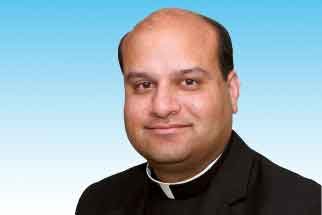
Fr. Raymond J. de Souza
Cardinal George stayed true to Church’s mission
Cardinal Francis George, recently retired archbishop of Chicago, died in his bed at home, as he said he would. In his latter years, the intellectual leader of the Catholic Church in the United States was famous for his bleak view of the future of religious liberty in America.
The great collaboration
This Sunday marks the 10th anniversary of the election of Joseph Ratzinger as Pope Benedict XVI, a treasure for the Church in his long theological service as a scholar, his more than 20 years at the side of St. John Paul II as the chief lieutenant of the signal pontificate of our era, his eight years as perhaps the clearest and most profound papal preacher and writer of our time, and finally for the courage and humility of his abdication.
Return to the Garden
Every year during Holy Week, when the Church’s liturgy gives us an enormous amount of Scripture — two readings of the passion, good chunks of John’s Gospel for Holy Thursday and Easter Sunday, and the history of creation and salvation at the Easter Vigil — there is usually one verse or two that strikes me anew, as if I had never heard it before, or least, never in quite that way.
Easter invites us to choose the kingship of Christ
The drama of Holy Week is a story about a king. The crowd that welcomes Jesus on Sunday, waving their palm branches, acclaims Him: “Blessed is He who comes in the name of the Lord, the king of Israel!”
Evangelium Vitae at 20: ushering in a culture of life
Twenty years ago, on the Feast of the Annunciation 1995, St. John Paul II published one of his signature encyclicals, Evangelium Vitae (The Gospel of Life). It’s important to return to the richness of that teaching, as many who oppose the Church’s pro-life witness having been making mischief with Pope Francis’ remark that Catholics should not be obsessed with abortion.
Christian disciples united by legacy of John Paul II
I had the pleasure this past week of hosting George Weigel, one of the Church’s leading public intellectuals, in Toronto and Kingston. I had long wanted to host Weigel, a mentor and friend and colleague for more than 20 years, and thought that 2015, the 10th anniversary of the death of St. John Paul II, would be the perfect year to do it.
Death to the death penalty
I have been staunchly against the death penalty since I started visiting the now-defunct Kingston Penitentiary as an undergraduate, meeting weekly with a group of prisoners sentenced to life imprisonment.
War on houses of worship
As I wrote last week from Jerusalem, just months after the massacre at a synagogue in Har Nof, an ultra-Orthodox Jewish neighbourhood, I felt a duty to make a visit, to pray for the dead and to offer, in a small way, solidarity with those who suffered the desecration of their house of worship.
Where is it safe to be Jewish?
JERUSALEM - Where is it safe for Jews to live?
Benedict Daswa African martyr
One of the dynamics of last year’s Synod on the Family was the contrast between the German-speaking bishops, who have been preoccupied with finding a way for those in invalid marriages to receive Holy Communion since Joseph Ratzinger and Walter Kasper were young theologians, and the African bishops. The latter, not to put too fine a point on it, objected that it was not possible for the Church to teach that simultaneous polygamy was immoral for poor black Catholics in Africa while serial polygamy was okay for rich, white Catholics in Europe.

